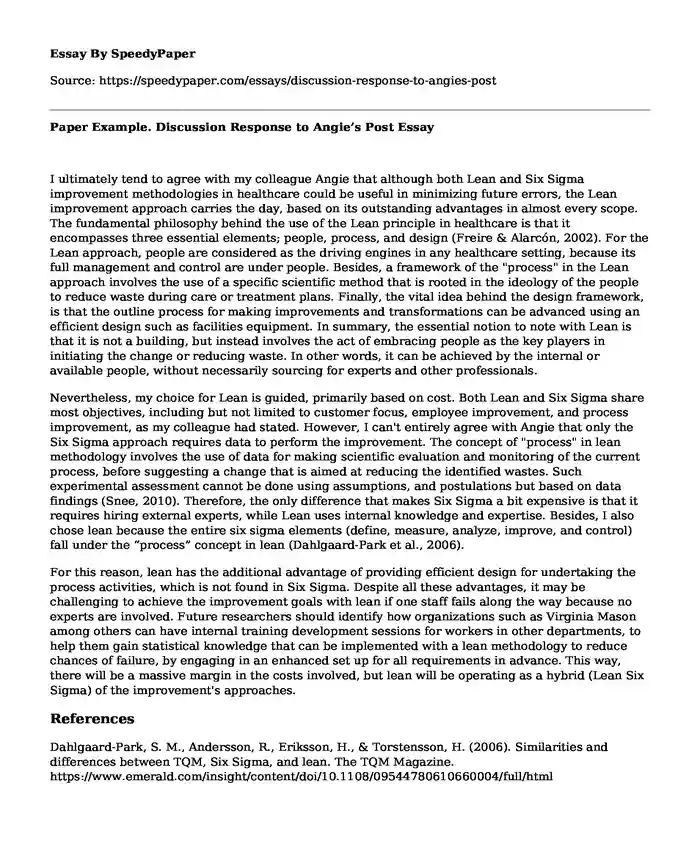
| Essay type: | Compare and contrast |
| Categories: | Organizational behavior Healthcare policy |
| Pages: | 3 |
| Wordcount: | 567 words |
I ultimately tend to agree with my colleague Angie that although both Lean and Six Sigma improvement methodologies in healthcare could be useful in minimizing future errors, the Lean improvement approach carries the day, based on its outstanding advantages in almost every scope. The fundamental philosophy behind the use of the Lean principle in healthcare is that it encompasses three essential elements; people, process, and design (Freire & Alarcón, 2002). For the Lean approach, people are considered as the driving engines in any healthcare setting, because its full management and control are under people. Besides, a framework of the "process" in the Lean approach involves the use of a specific scientific method that is rooted in the ideology of the people to reduce waste during care or treatment plans. Finally, the vital idea behind the design framework, is that the outline process for making improvements and transformations can be advanced using an efficient design such as facilities equipment. In summary, the essential notion to note with Lean is that it is not a building, but instead involves the act of embracing people as the key players in initiating the change or reducing waste. In other words, it can be achieved by the internal or available people, without necessarily sourcing for experts and other professionals.
Nevertheless, my choice for Lean is guided, primarily based on cost. Both Lean and Six Sigma share most objectives, including but not limited to customer focus, employee improvement, and process improvement, as my colleague had stated. However, I can't entirely agree with Angie that only the Six Sigma approach requires data to perform the improvement. The concept of "process" in lean methodology involves the use of data for making scientific evaluation and monitoring of the current process, before suggesting a change that is aimed at reducing the identified wastes. Such experimental assessment cannot be done using assumptions, and postulations but based on data findings (Snee, 2010). Therefore, the only difference that makes Six Sigma a bit expensive is that it requires hiring external experts, while Lean uses internal knowledge and expertise. Besides, I also chose lean because the entire six sigma elements (define, measure, analyze, improve, and control) fall under the “process” concept in lean (DahlgaardPark et al., 2006).
For this reason, lean has the additional advantage of providing efficient design for undertaking the process activities, which is not found in Six Sigma. Despite all these advantages, it may be challenging to achieve the improvement goals with lean if one staff fails along the way because no experts are involved. Future researchers should identify how organizations such as Virginia Mason among others can have internal training development sessions for workers in other departments, to help them gain statistical knowledge that can be implemented with a lean methodology to reduce chances of failure, by engaging in an enhanced set up for all requirements in advance. This way, there will be a massive margin in the costs involved, but lean will be operating as a hybrid (Lean Six Sigma) of the improvement's approaches.
References
DahlgaardPark, S. M., Andersson, R., Eriksson, H., & Torstensson, H. (2006). Similarities and differences between TQM, Six Sigma, and lean. The TQM Magazine. https://www.emerald.com/insight/content/doi/10.1108/09544780610660004/full/html
Freire, J., & Alarcón, L. F. (2002). Achieving a lean design process: Improvement methodology. Journal of Construction Engineering and Management, 128(3), 248-256. https://ascelibrary.org/doi/abs/10.1061/(ASCE)0733-9364(2002)128:3(248)
Snee, R. D. (2010). Lean Six Sigma–getting better all the time. International Journal of Lean Six Sigma. https://www.emerald.com/insight/content/doi/10.1108/20401461011033130/full/html
Cite this page
Paper Example. Discussion Response to Angie's Post. (2023, Sep 25). Retrieved from https://speedypaper.com/essays/discussion-response-to-angies-post
Request Removal
If you are the original author of this essay and no longer wish to have it published on the SpeedyPaper website, please click below to request its removal:
- Free Essay Sample: War on Drugs and Minority
- Free Essay - Policy Influences on Healthcare Decisions
- Paper Example. Ethics Failures in a Business
- Essay Sample on How Leaders Manage and Balance the Duties
- Free Essay: Engaging With Community and Organization
- Essay Example: Health Systems Thinking
- Essay Example. Staffing Plan for an Expanding Technology Company
Popular categories




